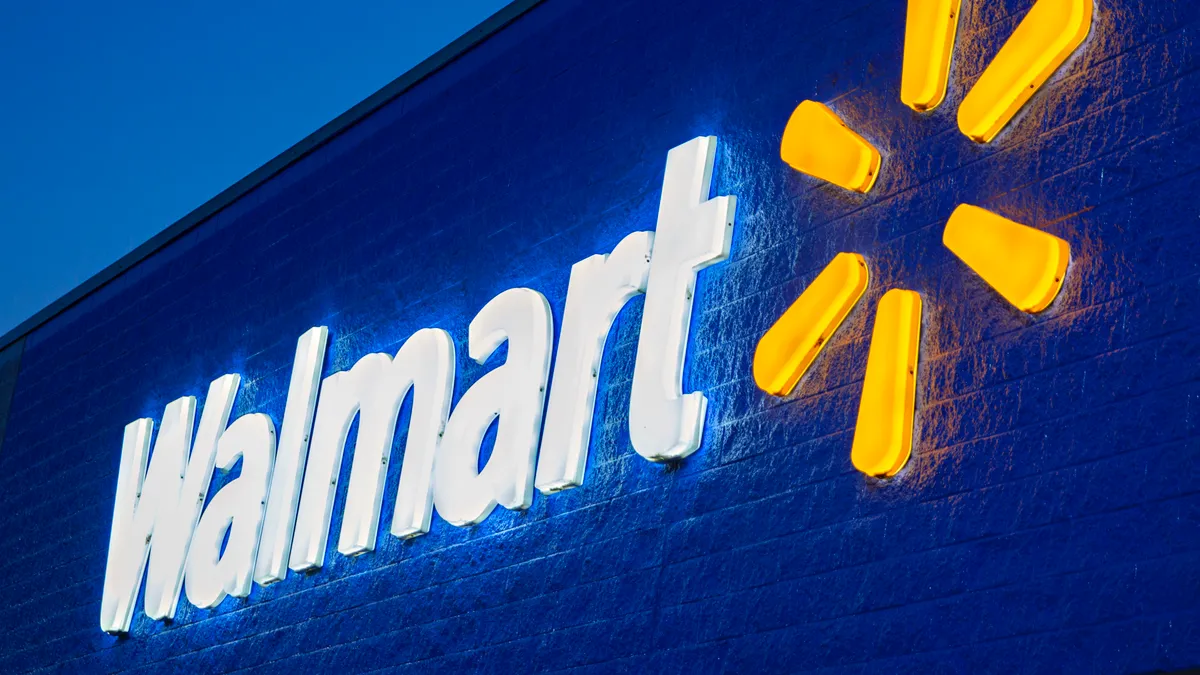Dive Brief:
- Walmart will spend $350 billion over the next decade on supplies produced, grown or assembled in the U.S., John Furner, president and CEO of Walmart U.S., said in a blog post Wednesday.
- Furner touted benefits such as increased support for small and diverse suppliers in the U.S., plus reduced carbon emissions, as the retailer sources closer to the end consumer.
- Walmart also plans to work with manufacturers, academics, governments and development groups through a program called "American Lighthouses." The groups will pinpoint barriers to U.S. production with the goal of returning manufacturing to U.S. shores long term.
Dive Insight:
Walmart has invested in U.S.-based sourcing in the past, with a commitment in 2013 to spend $250 billion on U.S.-made products.
Now the retailer is expanding upon that initiative as buy-American sentiment has been steadily growing among consumers. Furner wrote that 85% of customers signaled it's important to them that Walmart carry products made or assembled in the U.S., citing a survey by the retailer's customer insights team.
Buy American is also a priority of the current presidential administration. President Joe Biden signed an executive order in January directing federal procurement to focus on U.S.-made goods. Walmart's American Lighthouses program would work with the public sector to reshore manufacturing. But experts question the extent to which supply chains will return to the U.S., given the cost benefits of producing overseas. A recent UBS report called widescale supply chain relocation "overhyped."
Furner said the $350 billion investment means increased spending on U.S.-based small businesses and diverse suppliers.
Walmart is well-known for engaging with its supplier base and aiming to support small and minority businesses.
The retailer holds annual Open Call events in which entrepreneurs pitch their products for a spot on Walmart shelves — from freeze-dried dog treats to deodorants that can be used by women undergoing cancer treatments.
Walmart's Women’s Economic Empowerment initiative, launched in 2011, committed to sourcing $20 billion from women-owned businesses in the U.S. in five years. The retailer exceeded that goal by $1.2 billion.
Supplying to Walmart is a position many businesses hold in high regard, given its scope and scale.
"Being selected can be life changing for these entrepreneurs," Charles Crowson, local communications director for Northern U.S. for Walmart, told Supply Chain Dive last year in regards to the Open Call event.
Walmart said it, too, benefits from a local and diverse sourcing base.
"Women are our primary customers," said Jenny Grieser, retired senior director of Women's Economic Empowerment at Walmart. "When you invest in women, they put their earnings back into the community."
Sourcing locally carries the added benefit of decreasing supply chain risk for Walmart.
Suppliers closer to the end consumer result in shorter lead times, as well as fewer transportation emissions. Walmart estimated avoiding 100 million metric tons of carbon emissions through its manufacturing commitment.














